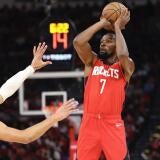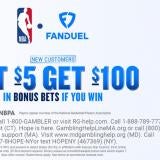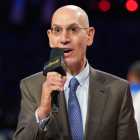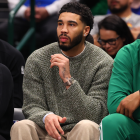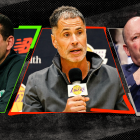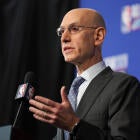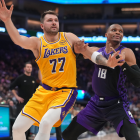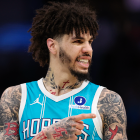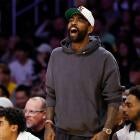NBA offseason winners & losers: Thunder, Celts smiling; Cavs, Knicks? Not so much
For Cleveland, this summer is really the start of next summer, when LeBron James can leave

The busiest part of the NBA offseason is winding down, and, man, has it been some kind of exciting. All sorts of big names will be in new places come next season, and this year's draft class is adding to their hype in Summer League. There may be a few more big moves in store (Carmelo Anthony, anyone?), but for the most part, we know where teams stand. So here we go with this offseason's winners and losers.
 Winner: Houston Rockets
Winner: Houston Rockets
A 55-win team added Chris Paul. Say no more. Yes, the Rockets gave up good young pieces and Patrick Beverley, but Paul makes them so much better from a talent standpoint. How he'll fit as a second ball-dominant guard next to James Harden will have to be worked out, but that's a good problem. P.J. Tucker, who Houston also added, is quietly a really nice player, and getting Nene back for three years and $11 million is a bargain. They topped it off by inking Harden to the richest contract extension in NBA history (he'll make $228 million over the next six years), meaning if they can re-sign Paul next summer, they would have arguably the best backcourt in the league locked up for a while.
Oh, and Houston may not be done. Anthony to Houston could very realistically happen. Even if doesn't, this has been a big-time offseason in Houston.
 Loser: Los Angeles Clippers
Loser: Los Angeles Clippers
If acquiring Paul makes you a winner, then losing him -- on some level -- makes you a loser. Yes, the Clippers rebounded by signing Blake Griffin to a five-year max worth $175 million, but that feels like a bit of a cornered move after Paul left. Griffin hasn't shown he can be a true No. 1 option on a good-to-great team, and he's injury prone. That contract could look OK in a few years, but it also could look pretty bad on the books.
Also, losing J.J. Redick -- among the league's best deep-shooting threats -- is tough. Bringing in Danilo Gallinari softens that blow, but this is mostly about losing Paul and the Clippers going from a top-four-ish team in the West to potentially fighting for their playoff lives. It's a shame we never truly saw what Lob City could have been. So many things went against them -- untimely injuries, the Donald Sterling fiasco, the Warriors becoming the Warriors. In another era, a trio of Paul, Griffin and DeAndre Jordan may have been the envy of the league. But it never came to fruition as the Clippers hoped -- and many expected -- it would.
 Winner: Oklahoma City Thunder
Winner: Oklahoma City Thunder
One year after losing Kevin Durant, they recover by adding Paul George and shedding Victor Oladipo's contract, which has four years and $84 million left on it. Patrick Patterson is also a really nice signing. He's perfect for what they need, a stretch four who can defend on the perimeter. After re-signing Andre Roberson, who may be the league's best perimeter defender, the Thunder look best-equipped to pose a challenge to the Warriors defensively.
With Roberson, George and Patterson switching all over the place, a more-energized Russell Westbrook wreaking his own havoc and Steven Adams behind them as one of the league's best rim protectors, that's stout. And George obviously takes the offense to another level. The cloud over all this is that George could be a one-year rental if he signs with the Lakers next summer, which more or less is his stated intention. But right now, the Thunder have bounced back from losing a franchise player about as well as -- or better than -- could be expected.
 Loser: Cleveland Cavaliers
Loser: Cleveland Cavaliers
They didn't get worse, but they didn't get better -- adding Jose Calderon and Jeff Green. With LeBron James' 2018 free agency looming, that's a problem. We know this team isn't good enough to beat the Warriors at full strength, and Cleveland does not have a ton of options to close that gap. They have no cap space and no draft picks available to trade until 2021. Their big play this summer was to find a taker for Kevin Love in a multi-team trade netting George or Jimmy Butler. This was no secret, and they struck out on both players.
Are they still the second-best team in the league? Probably. While OKC and Houston have at least made second-best a discussion, Cleveland still has James. The difference between the Cavs and the Rockets or Thunder is those teams would love to be second best. The Cavs hate it. More important, James hates it. For the Cavs, this summer was about one thing: Somehow close the gap on the Warriors the same way Boston was trying to close the gap on Cleveland. Boston succeeded and Cleveland didn't -- and that's a double loss for the Cavs.
 Winner: Boston Celtics
Winner: Boston Celtics
Did they jump into true championship contention? Seems unlikely. Gordon Hayward isn't going to single-handedly make that difference, especially when the Warriors are so far ahead of Boston. But the Hayward signing is a win in two ways: First, along with Marcus Morris (who they got in a trade for Avery Bradley) and No. 3 overall pick Jayson Tatum, Hayward makes the Celtics better right away. A fringe threat to upset the Cavs in the East is probably fair. Second, and perhaps more important, Hayward is only 27, locked up for four years and keeps the Celtics on a steady track of improvement.
Losing Bradley is tough, and quietly Kelly Olynyk (who signed with Miami) was a nice player. But adding Hayward, Morris and Tatum far outweighs those losses. Plus, next season, the Celtics have two picks that could be in the top five. A nice summer for Danny Ainge and Co.
 Loser: Indiana Pacers
Loser: Indiana Pacers
They got robbed on the George deal. No draft picks and Oladipo's aforementioned $84 million contract in return for one of the league's top six or seven best players. They almost certainly had better offers for George from the Cavs and Celtics. Why they didn't take them is anyone's guess, but on paper, if a guy like Love was available -- and there is every reason to believe he was -- opting for the package of Oladipo, at that price, and Domantas Sabonis is pretty hard to understand. Oh, and they also lost C.J. Miles.
 Winner: Sacramento Kings
Winner: Sacramento Kings
It started with a really strong draft, when Sacramento landed De'Aaron Fox (who many think could be the best point guard in this draft), Justin Jackson and Harry Giles in the first round. Giles was the No. 1 prospect in this class not too long ago. He's had three knee surgeries and didn't look great in his one season at Duke, but has huge upside relative to his No. 20 draft position.
Then, to usher in and groom all that youth, the Kings brought in three total pros: George Hill, Zach Randolph and Vince Carter. Sacramento won't compete for a West playoff spot next season, and maybe not anytime soon, but this summer -- for the first time in a long time -- they took a step in the right direction.
 Winner: Los Angeles Lakers
Winner: Los Angeles Lakers
They got their guy in Lonzo Ball, who they think is a franchise point guard, and they cleared heavy money from the books by moving D'Angelo Russell and Timofey Mozgov's dead-weight contract ($48 million over the next three years) to the Nets in exchange for Brook Lopez and the No. 27 pick in the draft. That pick became Kyle Kuzma, who has impressed in the Summer League.
But the real win is the salary dump. Lopez is a good player on an expiring deal. Russell was expendable because of Ball. They signed Kentavious Caldwell-Pope to a one-year, $18 million deal, which doesn't compromise flexibility, and now L.A. figures to have room to make a run at two max free agents next year, when James, Westbrook and George could be on the market.
 Loser: Washington Wizards
Loser: Washington Wizards
They did nothing to bolster their bench, a major source of concern. Last season, the Wizards' starting unit was among the league's best; they just had no chance to win big with that bench. They still nearly reached the conference finals because the Celtics were not as good as their No. 1 seed would imply, and because John Wall is a flat-out stud. However, this team feels absolutely maxed out and did nothing to change that.
Speaking of maxed out, the Wizards gave Otto Porter $107 million over four years, matching the max offer Brooklyn threw at him and making him the club's highest-paid player. Porter quickly has become a really good two-way player and one of the league's best 3-point shooters (at least he was last season), but that's a lot of money for a guy who may not be better than a No. 4 player on a true title contender. The Wizards are deep into the luxury tax and Wall still hasn't agreed to an extension. No way Washington is any closer to beating the Cavs in the East, and the team they were chasing for that next-best slot -- the Celtics -- got better.
 Winner: Minnesota Timberwolves
Winner: Minnesota Timberwolves
A huge draft-night deal netted Butler, and they've been filling holes since. First, they added Jeff Teague to replace Ricky Rubio, who they traded to the Jazz. Then they brought in Taj Gibson and Jamal Crawford. Teague and Crawford give them needed shooting and spacing. Butler, obviously, is a major get. This is pretty simple: Going into the offseason, our SportsLine projections had Minnesota floating around the No. 12 spot in the West. Now they're projected to compete for a top-four seed and home-court advantage in the first round. All told, they have gone from a 20 percent chance of making the playoffs to a more than 80 percent chance.
 Loser: Utah Jazz
Loser: Utah Jazz
Utah was in the middle of a six-year rebuilding project (after trading Deron Williams in 2011), and it came to a screeching halt when Hayward left. Yes, they still have Rudy Gobert and some nice peripheral pieces (Derrick Favors, Rodney Hood, Joe Ingles, Dante Exum, Joe Johnson) and they brought in Rubio to replace Hill, but Hayward was the player who took Utah from being a nice team to a potential contender down the road.
Utah won 51 games and was a top-five seed last season, and it could have been higher if not for some injuries. Next season, it would be no shock if the Jazz miss the playoffs. That's tough for a team that did everything it could to keep its star.
 Winner: Philadelphia 76ers
Winner: Philadelphia 76ers
Big-time offseason, as Philly validates Sam Hinkie's Process more every day. First, they moved up to get Markelle Fultz with the No. 1 pick in the draft, while also giving themselves a shot at next year's No. 1 pick via protections. Fultz is -- in many experts' estimation -- as close to can't-miss as it gets, with a legit shot to be great. Add him to Joel Embiid, Ben Simmons and Dario Saric, and that's as promising a young group as anyone in the league can claim.
But that's not all. The Sixers also added vets Redick and Amir Johnson on one-year deals for some experienced leadership (particularly Redick) without compromising future flexibility. It sounds weird, but it would be kind of a surprise if the Sixers didn't make the playoffs next season, though that may say as much about the Eastern Conference as it does the Sixers.
 Winner: Golden State Warriors
Winner: Golden State Warriors
They re-signed everyone of significance. Stephen Curry got what was the richest contract in history until Harden one-upped him. Durant took close to $10 million less than he was eligible to get, enabling the Warriors to bring back Andre Iguodala and Shaun Livingston. David West is back. Zaza Pachulia is back. Ian Clark and JaVale McGee are still out there, but for all intents and purposes, the Warriors bring back one of the greatest teams ever with zero hassle. On top of that, they added Nick Young and Omri Casspi, both capable 3-pointers, to their ridiculously deep bench.
The Warriors are skewing so many things in the NBA. There are a lot of good teams, teams with two and even three superstars, teams that made significant upgrades this offseason, and it all still feels almost insurmountable for everyone else.
 Loser: New York Knicks
Loser: New York Knicks
Fired Phil Jackson, which was probably a good thing, but then had David Griffin pull out of the GM search. They may trade Anthony. But the kicker: They gave Tim Hardaway Jr. $71 million over four years. This is the same Tim Hardaway Jr. they traded two years ago for Jerian Grant, who they dealt for Derrick Rose, who they now must renounce to afford Hardaway -- the guy they could have kept two years ago. Even Hardaway couldn't believe the offer.
Also, they drafted point guard Frank Ntilikina No. 8 overall. So, of course, they're talking about bringing in Rajon Rondo, which makes about as much sense as anything the Knicks do.
 Winner: Denver Nuggets
Winner: Denver Nuggets
Paul Millsap is probably the biggest free-agent signing in franchise history (Kenyon Martin back in the day may be in the ballpark), so that's a win. Millsap is 32 and isn't going to turn Denver into a playoff team on his own, but he gets them closer and gives them a real shot of credibility with future free agents. The Nuggets face a tough road in trying to grab one of those last playoff spots in the West, but Millsap solidifies a nice young core next to Nikola Jokic.
 Winner: Miami Heat
Winner: Miami Heat
They missed on Hayward, a definite bummer. But this was one of the best teams in the league over the second half of last season, and they quietly kept building with some nice, if low-profile parts. They signed Olynyk, who brings no flash but is just quietly a pretty good big who can stretch the floor. They brought back Dion Waiters and James Johnson, and their first-round pick, Bam Adebayo from Kentucky, is showing some good signs in Summer League. Miami should definitely be a playoff team in the East next year, if not a top-four seed.
 Winner: San Antonio Spurs
Winner: San Antonio Spurs
They re-signed Patty Mills for a really fair $50 million over four years, and they landed Rudy Gay from the bargain rack. Gay has caught a lot of flak as a guy who gets numbers on bad teams. But listen, for a little more than $8 million a year on a two-year deal, that is a steal. Only six players have averaged at least 17 points each of the past 10 seasons: James, Durant, Melo, Dwyane Wade, LaMarcus Aldridge and Gay. The guy can flat out score, and whatever deficiencies he has will be pretty well hidden in that Spurs' system. A quiet-but-solid offseason, and if San Antonio can move Tony Parker's expiring deal at the trade deadline for an impact player, watch out.
 Winner: Brooklyn Nets
Winner: Brooklyn Nets
When you're the Nets, you have to land talent any way you can, and this summer they got Russell, who not that long ago was considered an elite talent -- and still is in a lot of people's estimation. They also got their hands on DeMarre Carroll, who has struggled to stay healthy and didn't really work out in Toronto. But if you're the Nets, you're not going to get perfect players from perfect situations. You have to take on some baggage, some risk, to get real talent, and both or those guys can really play. With what Brooklyn was working with, it's tough to call this summer anything but a success.
 Winner: Chicago Bulls
Winner: Chicago Bulls
A lot of people think Chicago got fleeced on the Butler deal. But there's a case to be made they were not fleeced at all. Last year, Kris Dunn was seen as perhaps the best talent in the 2016 draft, and still could be. Tom Thibodeau didn't really play or grow him, but many saw Dunn as a franchise point guard last year at this time. Now the Bulls start rebuilding with Dunn, Zach LaVine, another good young player, and Lauri Markkanen, the No. 7 overall draft pick who is a 7-footer with a legit 3-point range and fluid offensive skills.
People get hung up on Chicago failing to get any picks for Butler, but Markkanen is a pick, and Dunn is as good as a pick -- maybe better than a lot of guys they otherwise would draft. Chicago was going to lose Butler. Could they have gotten more? Sure. Same way Boston probably could have gotten more than Marcus Morris for Avery Bradley, but the Celtics did what they had to do to sign Hayward and came out pretty good. And Chicago came out a lot better than people think this offseason.
 Winner: Portland Trail Blazers
Winner: Portland Trail Blazers
This is all about Zach Collins, who they moved up to get at the No. 10 spot. Is he going to make a huge difference right away? Depends what you consider huge -- but he's going to be good, and in a few years, he could be really good. Portland was on the outside of a lot of the offseason, other than having a few Paul George rumors attached to them for a second, because they have zero cap space (they're committed to over $136 million next year, with the cap around $99 million) and almost no movable contracts.
So from where they were sitting with three first-round picks, moving up to get Collins was the best player they were going to get. A lot of people think this guy has a chance to be a really good player. You know about Damian Lillard and C.J. McCollum, and don't forget about Jusuf Nurkic. Add Collins in there and a nice core is coming together, even if the Western Conference swallows "nice cores" for breakfast.
 Winner: Toronto Raptors
Winner: Toronto Raptors
We'll call them a winner by a nose, but really they're on the fence. Effectively, they simply brought back the core of a team that we know isn't good enough, but at the same time, there are a lot of teams that would like to have the Raptors' core. Getting Kyle Lowry on a three-year deal rather than the full five-year max is a win, and trading for C.J. Miles is an upgrade from P.J. Tucker. Losing Patrick Patterson hurts. The Serge Ibaka deal is maybe a bit of an overpay, but not terrible.
Look at it like this: In staying the same, the Raptors perhaps get better simply because the Eastern Conference got worse. But at the same time, the one team ahead of them in the chase for the Cavs -- the Boston Celtics -- got better. Tough to decide whether the Raptors won or lost this offseason, but in the end a 50-win team is nothing to sniff at and they managed to at least stay there while a lot of other teams couldn't keep their own stars and fell off the map.


